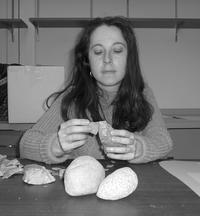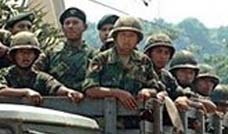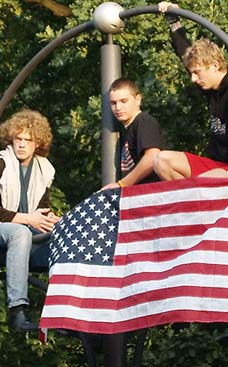
Robin joined the Peace Corps for four years after high school, when she first went to Belize. She was involved in education programs to teach Belizan children their native history instead of British history. The teaching of British history in Belize is a practice remnant of colonialism. "I knew what I wanted to do with archaeology was teach people and let people know why understanding the past is so important for today - how we could uncover lost knowledge," she said. For Robin, learning about what failed in the past is just as important as uncovering what was successful. "People's histories get erased. That's one of the things that happens with colonialism," Robin said. "I wanted to study the archaeology of ordinary people instead of kings and queens because when I was in the Peace Corps in Belize people would come to me and say: 'What about the people like us? What about farmers? How did ordinary people live?'" she said.
RPCV Cynthia Robin is currently excavating a Mayan site in Belize
A Presence in the Past
Gavin Myers talks to anthropologist Cynthia Robin.
Posted 03-04-2004, 11:55
by Gavin Myers
Cynthia Robin slowly sips a gin and tonic at the 1800 Club in Evanston as Tom Petty's "American Girl" plays in the background.
"It's a nice, simple drink," she says.
To her left sits Chris Kuzawa, a biological anthropologist, and on her right is Mary Weismantel, a cultural anthropologist. All three professors unwind after a hectic week.
"I also love the Barcelona Tapas and pitchers of Sangria," says Robin, Assistant Professor of Anthropology at Northwestern.
The five-foot tall archaeologist from Harlem has taught in the Department of Anthropology since 1999. She is currently excavating a Mayan site in Belize.
Despite having only been a faculty member for a short time, Robin has a tall list of credentials. She did her undergraduate work in archaeology at Rutgers University and completed a Ph.D in anthropology at Ivy League University of Pennsylvania in 1999.
Robin is 37 but occasionally gets mistaken for a graduate student.
"She has a very young spirit," said Marco Aiello, a third-year biological anthropology graduate student.
Robin spends Spring and Summer in Belize, doing groundbreaking excavations at the Mayan village of Chan. But when she isn't unearthing the past, Robin makes the most of her time at Northwestern.
"Most of my friends are my colleagues as well. What you guys don't see is that we go to the Davis Street Fish Market, or on Saturday night we'll have a dinner party," said Robin. "It's one big anthropology family."
Some of Robin's most memorable moments have been in nightclubs, listening to Latin American music with Professor of Anthropology Robert Launay.
"The Hot House is a place we really like to go," she said. "I study ancient community life, and part of that is I really want to be part of a community."
"She is a very positive person, and she doesn't have an over-inflated sense of self," said Tim Earle, Professor of Anthropology.
Robin was selected from some 100 applicants for her position as an assistant professor. During the interview process, Robin was "almost magical," Earle said.
Fellow archaeologist Elizabeth Brumfiel feels similarly.
"I think she's very friendly but also very serious about her research and contributing to our understanding of past worlds that people lived in," said Brumfiel, who is a Professor of Anthropology and President of the American Anthropological Association.
Brumfiel smiled as she recalled the time Robin played Hoopla at Starbucks with her, her husband, and her son.
"She's younger and sort of hip. She builds bridges easily," said James Brown, Professor of Anthropology.
Aiello, a teaching assistant for Robin's undergraduate Culture Origins class, agrees.
"I know when I hang out with her I'm always laughing. I've gone to the 1800 Club to just chill out and get a drink with her," he said.
But when she isn't chilling with her colleagues, Robin takes her work very seriously.
Every spring, Robin drives her Ford F-150 down the gulf coast to Belize, where she is involved with excavations at Chan, a Maya farming village occupied from the Middle Preclassic period (ca. 900-400 BC) to the Terminal Classic period (post-AD 790).
"These ordinary people were there for so long, and we are examining the role they played in the rise and fall of Mayan society," Robin said.
Robin wasn't born with a shovel and trowel in hand - but almost. By second grade, Robin knew she wanted to be an Egyptian archaeologist.
"I had a fabulous art teacher in second grade, and she had us lie down on big pieces of paper," Robin said. "We had to trace ourselves with a big marker and then we would paint it with the design of particular king or queen - like Osiris and Nubis."
From early on, Robin's parents encouraged her to take learning seriously.
"My family was always interested in culture and history," Robin said. "You know how most families are like, 'Let's go to the beach.' Not us. We are going to Salem to watch the witch trials."
In high school, Robin first encountered archaeology in the field as a contract archaeologist for Louis Berger & Associates in New Jersey. As a contract archaeologist, Robin assisted in excavating sites before large construction projects would come in.
"As a kid, seeing all the gold from King Tut's tomb really cemented the fact I wanted to be an archaeologist. I wanted to be an Egyptian archaeologist, then I grew out of that and wanted to become a Greek archaeologist and then after that a Roman archaeologist," she said.
"But then I realized that real people who live in New Jersey become New Jersey archaeologists," Robin said.
Despite this realization, Robin joined the Peace Corps for four years after high school, when she first went to Belize. She was involved in education programs to teach Belizan children their native history instead of British history.
The teaching of British history in Belize is a practice remnant of colonialism.
"I knew what I wanted to do with archaeology was teach people and let people know why understanding the past is so important for today - how we could uncover lost knowledge," she said.
For Robin, learning about what failed in the past is just as important as uncovering what was successful.
"People's histories get erased. That's one of the things that happens with colonialism," Robin said.
"I wanted to study the archaeology of ordinary people instead of kings and queens because when I was in the Peace Corps in Belize people would come to me and say: 'What about the people like us? What about farmers? How did ordinary people live?'" she said.
During her years as an archaeologist, Robin has had some extraordinary experiences.
"I saw a UFO when I was in Mexico," she said. "It looked like a green, hovering disk. The way I knew it was a UFO instead of shooting star or something was because it was moving very slowly and hovering above the trees."
After the sighting, Robin said she questioned people in the area.
"Everybody in the community saw it and identified it as that, but they don't have the cultural notion of a UFO like we do. No one was excited or thought it was unusual," she said.
Yet Robin's stories aren't the reason faculty and students feel she such an asset to the department. Instead, it's Robin's intense commitment to her students.
"She is just so enthusiastic about archaeology and her own personal work. And it rubs off onto the TAs," Aiello said.
Aiello describes Robin as "keen," and said Robin makes an effort to meet with her TAs weekly.
"She makes it really easy for non-archaeology grad students to enjoy what they are teaching," he said.
"She's very hands-on with the TAs and comes up with activities for us to do and she really tries to convey what she wants students to get out of the class. She has gone as far as to have them do flint knapping and make stone tools. She took time out on a Saturday to meet us and teach us flint knapping," Aiello said.
Undergraduates also think she's accessible.
"She's also very down-to-earth and in touch with her students," said Jason Downs, 19, a Weinberg sophomore from Houston, who took Culture Origins with Robin.
Downs remembers the time Robin cancelled the class's last reading assignment to give students more time to study for their last test.
Robin is a teacher who longs to form strong relationships with her students, said Shelley Kahn, 19, a Weinberg sophomore from Dublin, Calif. Kahn first developed an interest in archaeology after taking Robin's Culture Origins.
Kahn's parents weren't pleased.
"Cynthia said something along the lines of: Just tell your parents you can do whatever the hell or fuck you want," Kahn said. "I was shocked at first, because she seems so mild mannered. But now I realize it wasn't out of character."
Kahn said Robin encourages her students in the face of difficulty. "She's very positive. She can counter any negative point with something positive," she said.
Kahn said up through her first test in Culture Origins, Robin sent her a congratulatory email, telling her what a great job she had done on the exam.
"Cynthia is the only teacher I met who sincerely means it when she said, 'Come into office hours,'" Kahn said.












